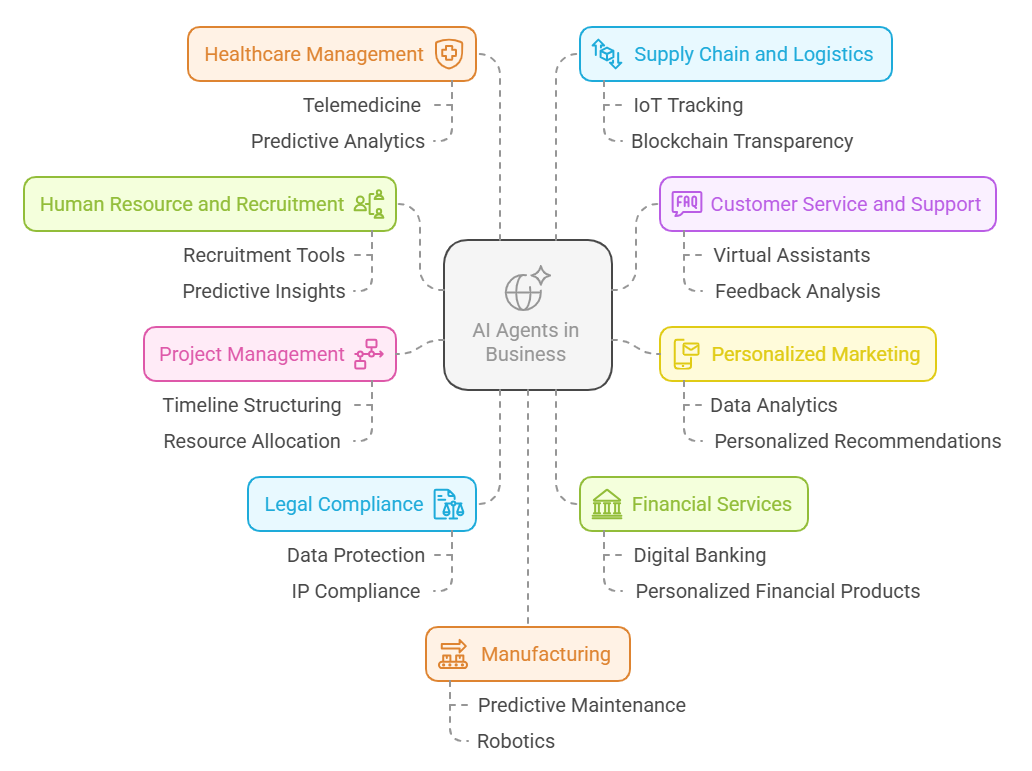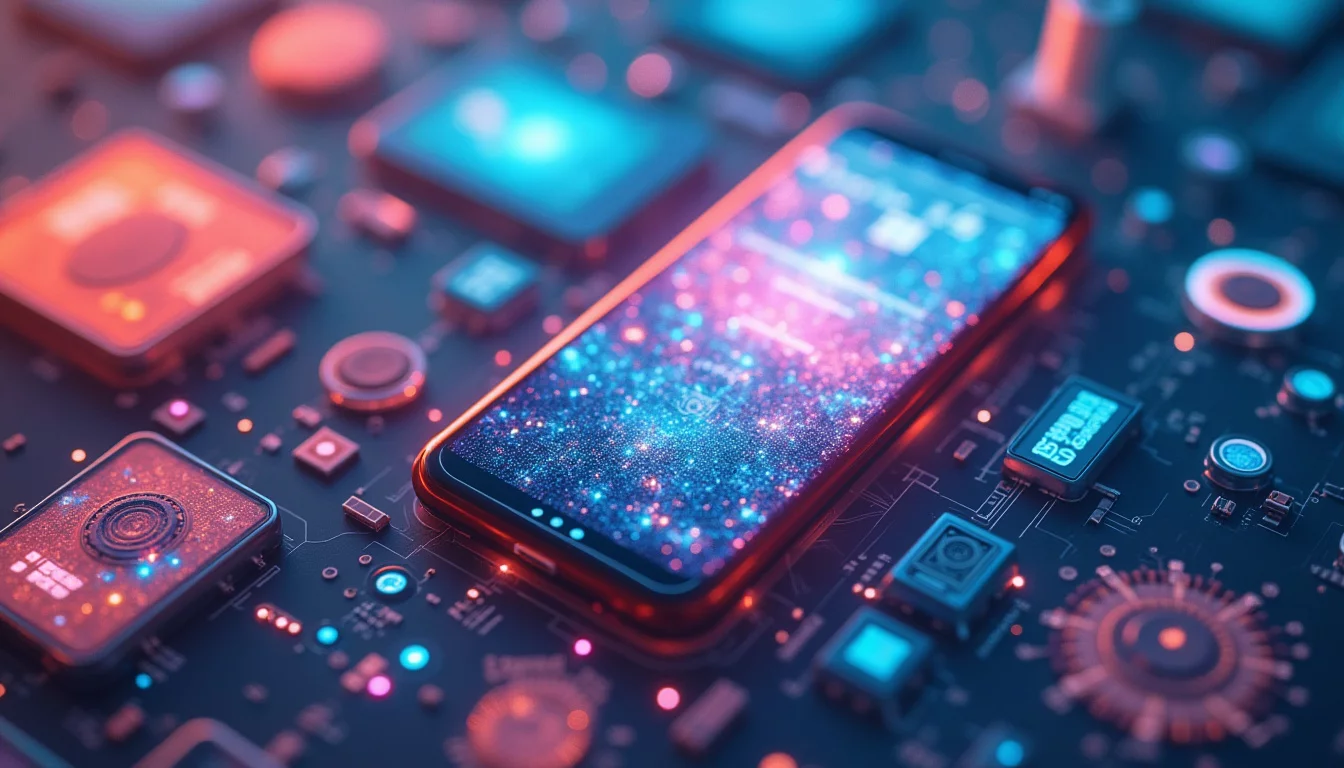Artificial Intelligence (AI) is transforming industries by enabling automation and intelligent decision-making. AI agents, designed to operate independently, range from simple automated programs to advanced machine learning models that adapt to their environment. These agents perform tasks such as data processing, decision-making, and problem-solving. Equipped with algorithms, they analyze information, learn from interactions, and make informed decisions based on predefined rules and new insights. This article describes 15 real-world case studies showcasing how AI Agents are transforming businesses across diverse industries.
15 AI Agents Case Studies
AI agents are revolutionizing businesses by automating tasks, improving efficiency, and enhancing decision-making. Here are 15 real-world case studies showcasing AI agent’s impact across various industries.

1. Human Resource and Recruitment
AI agents are becoming indispensable HR partners. They move beyond simple Applicant Tracking Systems (ATS) by autonomously screening resumes using Natural Language Processing (NLP), identifying best-fit candidates with nuanced understanding. Predictive ML models act as agents forecasting employee turnover with remarkable accuracy, allowing proactive retention strategies. Furthermore, AI agents can analyze workforce data to pinpoint emerging leaders and suggest optimal team compositions, turning HR into a strategic powerhouse. Solutions like IBM’s Watson Talent showcase how these agents provide data-driven insights for smarter workforce planning.
2. Customer Service and Support
The era of frustratingly simple chatbots is evolving. Modern AI agents’ power sophisticated virtual assistants capable of handling complex queries, processing transactions, and even understanding customer sentiment. Operating 24/7, these agents drastically reduce wait times, provide consistent service, and learn from interactions to personalize future support. Companies like Amazon leverage AI agents (like those behind Alexa) not just for Q&A, but for seamless integration with shopping and smart home ecosystems, driving engagement. Behind the scenes, AI agents analyze feedback patterns and predict customer needs, enabling proactive, rather than reactive, service.
3. Personalized Marketing
Generic marketing blasts are dead. AI agents excel at hyper-personalization. By analyzing vast streams of customer data—browsing history, purchase patterns, social interactions—these agents autonomously identify micro-segments and tailor messages, offers, and content in real-time. They optimize ad spend by predicting channel effectiveness and dynamically adjust campaigns based on performance. While tools like Mailchimp automate delivery, AI agents represent the intelligence deciding the who, what, when, and where of personalized outreach, dramatically boosting relevance and conversion rates, much like Amazon’s recommendation engine anticipates user desires.
4. Project Management
While traditional PM tools (like Asana or Microsoft Project) provide structure, AI agents inject intelligence. Imagine agents autonomously monitoring project progress, flagging potential delays based on predictive analytics, and suggesting resource reallocation to mitigate risks. They can automate routine status updates, analyze team communication patterns to identify potential bottlenecks, and even help optimize task assignments based on skills and workload. AI agents transform PM from reactive tracking to proactive, data-driven management.
5. Legal Compliance
Staying compliant in a complex regulatory landscape (GDPR, CCPA, industry-specific rules) is a significant challenge. AI agents act as tireless compliance officers, continuously scanning regulatory updates and internal documents. They can automatically identify potential non-compliance in contracts or data handling practices, flag risks, and even suggest remediation steps. By automating aspects of due diligence and monitoring, AI agents reduce human error, mitigate legal risks, and help maintain trust – crucial for managing everything from data privacy to Intellectual Property (referencing resources like WIPO for IP context).
6. Financial Services
The high-stakes world of finance relies heavily on AI agents. They power real-time fraud detection systems, analyzing transaction patterns to identify anomalies indicative of illicit activity far faster than humans can. Algorithmic trading agents execute complex strategies based on market data analysis and predefined rules. In customer-facing roles, AI agents provide personalized financial advice through robo-advisors and streamline processes like loan application analysis, enhancing efficiency and security across banking, insurance, and investment sectors.
7. Healthcare Management
AI agents are crucial allies in optimizing healthcare operations. They analyze historical and real-time data to predict patient admissions, forecast disease outbreaks (as seen during the pandemic), and optimize resource allocation (staff, beds, equipment). In diagnostics, AI agents assist clinicians by analyzing medical images (X-rays, MRIs) to detect subtle patterns potentially indicative of disease. By streamlining administrative tasks and providing powerful decision support tools, AI agents enhance efficiency, improve patient flow (aided by EHRs and telemedicine data), and ultimately contribute to better patient outcomes.
8. Supply Chain and Logistics
Modern supply chains generate enormous data via IoT sensors and transactions. AI agents thrive in this environment, optimizing logistics in real-time. They analyze traffic, weather, and demand data to dynamically reroute shipments, predict delivery times with high accuracy, and manage inventory proactively to prevent stockouts or overstocking. By integrating data from sources like IoT tracking and blockchain records, AI agents provide unprecedented end-to-end visibility and automate complex decision-making, leading to significant cost savings and enhanced reliability.
9. Manufacturing
AI agents are at the heart of Industry 4.0. Predictive maintenance agents analyze sensor data from machinery to anticipate failures before they happen, minimizing costly downtime. AI-powered computer vision agents perform quality control checks with superhuman speed and accuracy, identifying defects invisible to the human eye. Robotic agents, guided by AI, handle complex assembly tasks, optimize workflows on the factory floor, and adapt to changing production needs, driving efficiency, quality, and safety.
10. Security and Surveillance
AI agents elevate security from passive monitoring to active threat detection. Analyzing feeds from CCTV cameras and other sensors, these agents use facial recognition to identify persons of interest and anomaly detection to flag unusual behavior patterns that might indicate theft, intrusion, or danger. They can sift through massive datasets far exceeding human capacity, providing real-time alerts and enabling faster, more effective responses in environments ranging from airports to critical infrastructure.
11. Research and Development
AI agents are becoming powerful tools for researchers. In drug discovery, they analyze molecular structures and biological data to predict the efficacy and potential side effects of compounds, drastically shortening development timelines. In materials science, AI agents sift through vast databases to identify novel materials with desired properties. They also excel at modeling complex systems, such as climate change prediction, by processing enormous environmental datasets, thereby accelerating innovation and scientific breakthroughs across disciplines.
12. AI in Travel and Hospitality
AI agents enhance every stage of the travel experience. They power recommendation engines suggesting personalized itineraries and destinations based on past behavior and preferences. Dynamic pricing agents adjust fares and room rates in real-time based on demand and competitor analysis. AI chatbots act as 24/7 virtual concierges (like Hilton’s “Connie” concept), handling bookings, answering queries, and providing local information. Behind the scenes, AI agents optimize hotel operations, manage inventory, and personalize guest experiences through smart room technology.
13. AI in Software Testing
AI is revolutionizing software QA. AI agents autonomously execute repetitive tests (like regression testing) faster and more reliably than humans. More impressively, they use ML to analyze code and historical defect data to predict where new bugs are likely to emerge, allowing testers to focus efforts strategically. AI agents can also intelligently generate new test cases based on application requirements or user behavior analysis, ensuring more comprehensive coverage and identifying edge cases that might otherwise be missed.
14. Content Creation
While human creativity remains paramount, AI agents are emerging as powerful content creation assistants. They can analyze trends (using data from tools like BuzzSumo) to suggest engaging topics, generate draft versions of articles, social media posts, or marketing copy using advanced NLP models, and even create basic visual elements. Furthermore, AI agents can optimize existing content for SEO and audience engagement by analyzing performance data and suggesting improvements, acting as a tireless co-creator and editor.
15. Real Estate Management
AI agents streamline the complexities of real estate. They automate routine property management tasks, such as scheduling maintenance based on predictive analytics (e.g., anticipating HVAC issues) or processing lease agreements. AI-powered chatbots handle tenant inquiries around the clock, improving satisfaction. Critically, AI agents analyze market trends, property valuations (leveraged by platforms like Zillow/Redfin), and economic indicators to provide sophisticated investment insights and risk assessments, empowering data-driven decisions for developers, investors, and managers.
Final Thoughts
The future of technology, especially in artificial intelligence services, is set for remarkable advancements. In the coming years, AI will evolve through its integration with cutting-edge technologies like quantum computing and the Internet of Things (IoT). This convergence will significantly enhance AI’s capabilities, enabling smarter and more efficient solutions across industries such as healthcare, automotive, and manufacturing. As per Statista, AI agents are emerging as a pivotal advancement for businesses. These intelligent systems, capable of automating routine tasks and refining intricate operational processes, represent the next significant leap in artificial intelligence. Their inherent ability to learn, adapt, and execute informed decisions unlocks unprecedented avenues for innovation and practical application across a multitude of industries.
Additionally, the emphasis on ethical AI will become more prominent. As AI continues to shape daily life, ensuring fairness, transparency, and the mitigation of bias will be essential. This growing concern will drive the development of stricter regulations and industry standards, compelling businesses to adopt responsible AI practices for greater trust and accountability.
Frequently Asked Questions
AI is revolutionizing healthcare by enabling personalized treatment plans and improving patient care. It plays a crucial role in assisting surgical procedures, enhancing diagnostic precision, and predicting medical outcomes.
The timeline for developing an AI agent varies based on the project's scope and complexity. Simple solutions can be implemented within a few weeks, while more advanced AI agents may require several months to develop.
AI agents offer significant benefits across various sectors, including retail, healthcare, banking, manufacturing, and logistics. Businesses that depend on data analysis, automation, and customer engagement can utilize AI agents to enhance efficiency and streamline operations.










